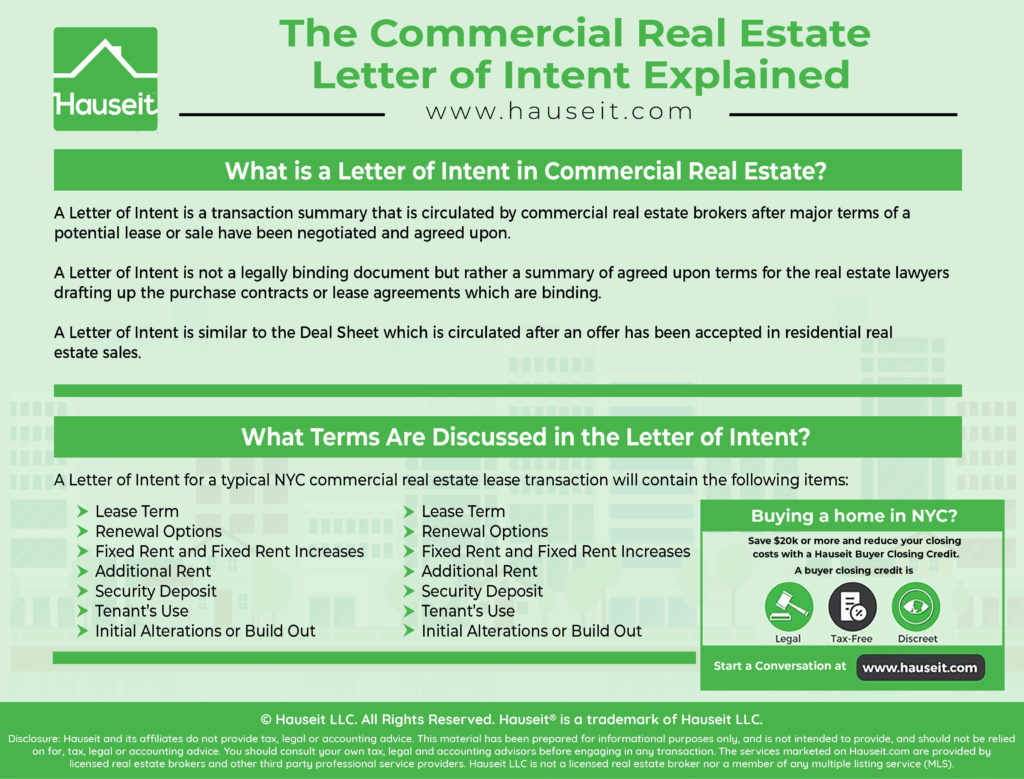What is a Letter of Intent in commercial real estate sales and leasing? Is a Letter of Intent binding? What terms and conditions are discussed?
We’ll explain everything you need to know about Letters of Intent and how they work in NYC commercial real estate.
Table of Contents:

What is a Letter of Intent in Commercial Real Estate?
A Letter of Intent is a transaction summary that is circulated by commercial real estate brokers after major terms of a potential lease or sale have been negotiated and agreed upon.
A Letter of Intent is not a legally binding document but rather a summary of agreed upon terms for the real estate lawyers drafting up the purchase contracts or lease agreements which are binding.
A Letter of Intent is similar to the Deal Sheet which is circulated after an offer has been accepted in residential real estate sales.
Get a 2% Rebate When You Buy
Save thousands on your home purchase with a buyer agent commission rebate from Hauseit
What Terms Are Discussed in the Letter of Intent?
A Letter of Intent for a typical NYC commercial real estate lease transaction will contain agreed upon terms for the following:
– Lease Term
– Renewal Options
– Fixed Rent and Fixed Rent Increases
– Additional Rent
– Security Deposit
– Tenant’s Use
– Initial Alterations or Build Out
– Commencement Date
– Rent Concessions, If Any
– Subletting and Assignment Rights
– Utilities
– Building Services
– Good Guy Guarantee
Save 2% On Your Home Purchase
Save thousands on your home purchase with a buyer agent commission rebate from Hauseit
Commercial Lease Agreements
In New York City, the landlords typically hold all of the leverage even in periods with softer market dynamics.
As a result, it is the landlord’s attorney who will prepare the initial draft of the lease agreement.
The landlord’s attorney may use any number of standard forms (i.e. REBNY, Blumberg, NY Bar Association etc.); however, they will always attach a lease rider that will typically be much longer in length. For example, a standard form may be 7 to 10 pages long, but the lease rider may be 40 to 45 pages in length and completely override what is said in the standard form. Some landlords have developed their own customized lease forms over time, in which case a separate rider may not be necessary.
Unlike in residential sales, it will be very rare for a commercial tenant to have a rider of their own. In fact, landlords will reject most tenant requests to change or edit a commercial lease. The traditional reason for this is because courts in New York tend to favor tenants, so landlords hedge this risk by having tough leases with language that strongly favor the landlords. With that said, bigger and more important tenants such as universities, anchor tenants and national chains will have more negotiating power.
Make Clear that the Letter of Intent is Non-Binding
You should engage a real estate attorney who specializes in commercial real estate transactions as soon as possible. Your attorney will advise you on language you should add as a precaution to any Letter of Intent to make it especially clear that it is indeed non-binding.
This is especially important if you will be signing the Letter of Intent. This is different vs residential real estate sales where the Deal Sheet is never signed.
Hire a Commercial Real Estate Attorney
It’s a good idea to be extra cautious given that there have been court cases where Letters of Intent have been ruled by courts to be binding.
This has happened when either party has issued a press release or otherwise celebrated their “deal” after signing a Letter of Intent.
Courts have ruled that these actions meant that the Letter of Intent they signed was in fact a binding agreement.
This Letter of Intent is not a legally binding document for either party and is only a summary of the basic terms and conditions to be incorporated into a formal written agreement. This Letter of Intent does not obligate either party to negotiate in good faith or to follow through and complete a formal written agreement.
A Full Service Listing for 1%
Sell your home with a traditional full service listing for just one percent commission.
Disclosure: Commissions are not set by law or any Realtor® association or MLS and are fully negotiable. No representation, guarantee or warranty of any kind is made regarding the completeness or accuracy of information provided. Square footage numbers are only estimates and should be independently verified. No legal, tax, financial or accounting advice provided.






